六年级上册英语杂记
六年级英语上册知识点总结
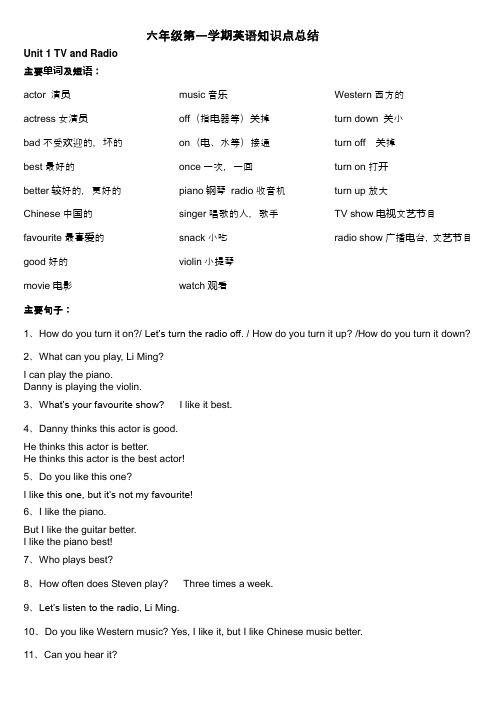
六年级第一学期英语知识点总结Unit 1 TV and Radio主要单词及短语:actor 演员actress女演员bad不受欢迎的,坏的best最好的better较好的,更好的Chinese中国的favourite最喜爱的good好的movie电影music音乐off(指电器等)关掉on(电、水等)接通once一次,一回piano钢琴radio收音机singer唱歌的人,歌手snack小吃violin小提琴watch观看Western西方的turn down 关小turn off 关掉turn on打开turn up放大TV show电视文艺节目radio show广播电台,文艺节目主要句子:1、How do you turn it on?/ Let’s turn the radio off. / How do you turn it up? /How do you turn it down?2、What can you play, Li Ming?I can play the piano.Danny is playing the violin.3、What’s your favourite show?I like it best.4、Danny thinks this actor is good.He thinks this actor is better.He thinks this actor is the best actor!5、Do you like this one?I like this one, but it’s not my favourite!6、I like the piano.But I like the guitar better.I like the piano best!7、Who plays best?8、How often does Steven play? Three times a week.9、Let’s listen to the radio, Li Ming.10、Do you like Western music? Yes, I like it, but I like Chinese music better.11、Can you hear it?12、Why is the radio playing Chinese music?13、Thanks for finding this radio show.14、Dinosaurs and people are different. I think dinosaurs and people are the same.15、What did you like best?I liked the dinosaur better than the rabbit, but I liked the snacks best.16、They order some food.17、Jenny wants Western food. “I would like a hamburger, French fries and milk, please.”18、I would like some Chinese food, please. I would like some noodles, dumplings and tea.19、There are many people at the restaurant.20、I can’t hear her. I can’t hear her either.重点语法复习:绝大多数形容词有三种形式,原级,比较级和最高级, 以表示形容词说明的性质在程度上的不同。
六年级上册英语u6知识点

六年级上册英语u6知识点以下是六年级上册英语U6的知识点总结:一、词汇本单元涉及的词汇主要包括学校设施、课程和活动相关的单词,例如:•gym 体育馆•art room 美术室•music room 音乐室•computer room 电脑室•library 图书馆•playground 操场•science lab 科学实验室•PE class 体育课•music class 音乐课•art class 美术课•computer class 电脑课二、句型1.询问某人在哪里:Where is ...? / Where are ...? 例如:Where is the gym? 体育馆在哪里?2.询问某人是否喜欢某物或做某事:Do you like ...? 例如:Do you like PE class? 你喜欢体育课吗?3.询问某人是否在某个地方:Is ... in/on/under ...? 例如:Is the ball in the gym? 球在体育馆里吗?4.表达喜欢做某事:I like ... 例如:I like playingbasketball. 我喜欢打篮球。
5.表达某人在某处做某事:... is/are ...ingin/on/under ... 例如:They are playing football on the playground. 他们在操场上踢足球。
三、语法1.现在进行时的用法:表示正在进行的动作或状态,通常由“be动词(am/is/are)+动词-ing”构成。
例如:They areplaying football. 他们正在踢足球。
2.一般现在时的用法:表示经常或习惯性的动作或状态,以及客观事实或普遍真理。
例如:I like playing basketball. 我喜欢打篮球。
3.特殊疑问句的用法:以特殊疑问词(如where、what、who等)开头的疑问句,用于询问特定的信息。
六年级上册1~6单元英语笔记
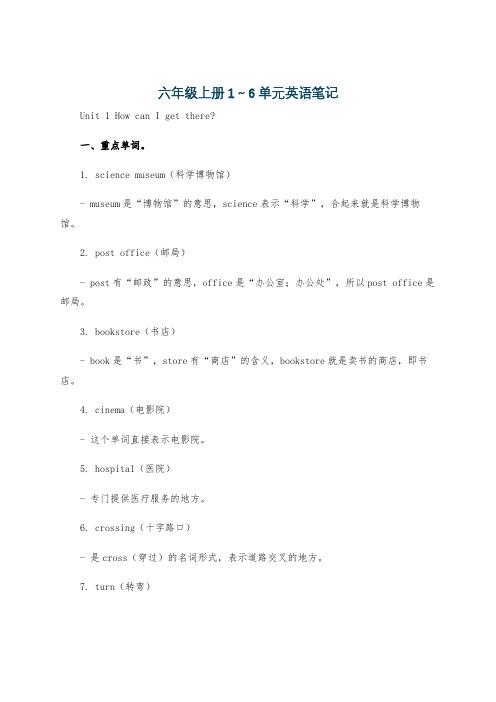
六年级上册1~6单元英语笔记Unit 1 How can I get there?一、重点单词。
1. science museum(科学博物馆)- museum是“博物馆”的意思,science表示“科学”,合起来就是科学博物馆。
2. post office(邮局)- post有“邮政”的意思,office是“办公室;办公处”,所以post office是邮局。
3. bookstore(书店)- book是“书”,store有“商店”的含义,bookstore就是卖书的商店,即书店。
4. cinema(电影院)- 这个单词直接表示电影院。
5. hospital(医院)- 专门提供医疗服务的地方。
6. crossing(十字路口)- 是cross(穿过)的名词形式,表示道路交叉的地方。
7. turn(转弯)- 既可以作动词,如turn left(向左转),turn right(向右转);也可以作名词。
二、重点短语。
1. near(在……附近)- 例如:The post office is near the bookstore.(邮局在书店附近。
)2. next to(紧挨着;与……相邻)- My home is next to the cinema.(我的家紧挨着电影院。
)3. in front of(在……前面)- There is a tree in front of my house.(我家前面有一棵树。
注意:in front of是在物体外部的前面,而in the front of是在物体内部的前面,如There is a blackboard in the front of the classroom.教室里前面有一块黑板。
)4. behind(在……后面)- The cat is behind the box.(猫在盒子后面。
)5. go straight(直走)- Go straight and you can see the hospital.(直走你就能看到医院。
六年级英语上册重点笔记
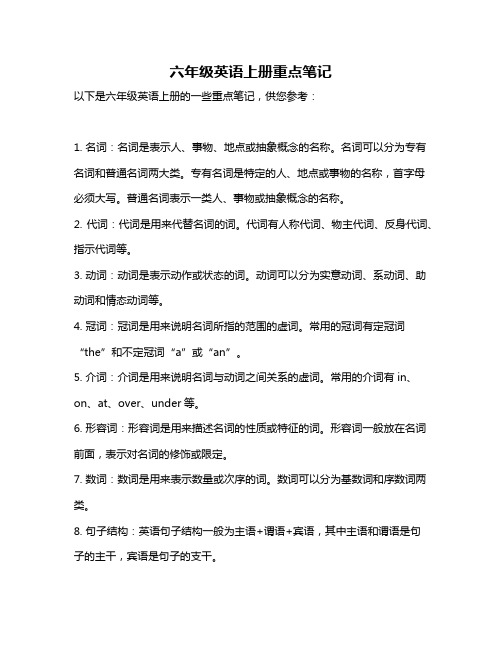
六年级英语上册重点笔记
以下是六年级英语上册的一些重点笔记,供您参考:
1. 名词:名词是表示人、事物、地点或抽象概念的名称。
名词可以分为专有名词和普通名词两大类。
专有名词是特定的人、地点或事物的名称,首字母必须大写。
普通名词表示一类人、事物或抽象概念的名称。
2. 代词:代词是用来代替名词的词。
代词有人称代词、物主代词、反身代词、指示代词等。
3. 动词:动词是表示动作或状态的词。
动词可以分为实意动词、系动词、助动词和情态动词等。
4. 冠词:冠词是用来说明名词所指的范围的虚词。
常用的冠词有定冠词“the”和不定冠词“a”或“an”。
5. 介词:介词是用来说明名词与动词之间关系的虚词。
常用的介词有in、on、at、over、under等。
6. 形容词:形容词是用来描述名词的性质或特征的词。
形容词一般放在名词前面,表示对名词的修饰或限定。
7. 数词:数词是用来表示数量或次序的词。
数词可以分为基数词和序数词两类。
8. 句子结构:英语句子结构一般为主语+谓语+宾语,其中主语和谓语是句
子的主干,宾语是句子的支干。
9. 句子类型:英语句子可以分为陈述句、疑问句和祈使句三大类。
陈述句用来陈述事实或观点;疑问句用来提出问题;祈使句用来发出命令或请求。
10. 时态:时态是用来表示动作发生的时间和方式的语法形式。
英语中常用的时态有现在时、过去时、将来时等。
六年级上册英语知识梳理笔记
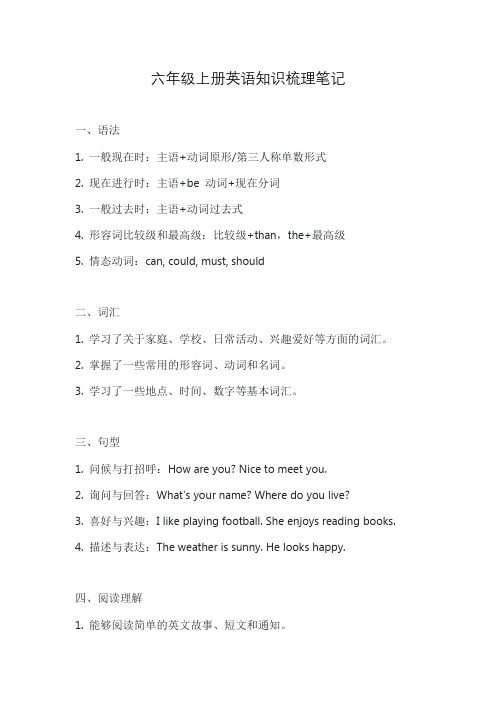
六年级上册英语知识梳理笔记
一、语法
1. 一般现在时:主语+动词原形/第三人称单数形式
2. 现在进行时:主语+be 动词+现在分词
3. 一般过去时:主语+动词过去式
4. 形容词比较级和最高级:比较级+than,the+最高级
5. 情态动词:can, could, must, should
二、词汇
1. 学习了关于家庭、学校、日常活动、兴趣爱好等方面的词汇。
2. 掌握了一些常用的形容词、动词和名词。
3. 学习了一些地点、时间、数字等基本词汇。
三、句型
1. 问候与打招呼:How are you? Nice to meet you.
2. 询问与回答:What's your name? Where do you live?
3. 喜好与兴趣:I like playing football. She enjoys reading books.
4. 描述与表达:The weather is sunny. He looks happy.
四、阅读理解
1. 能够阅读简单的英文故事、短文和通知。
2. 理解主要内容和细节。
3. 回答关于阅读材料的问题。
PEP初中英语六年级上册知识点归纳
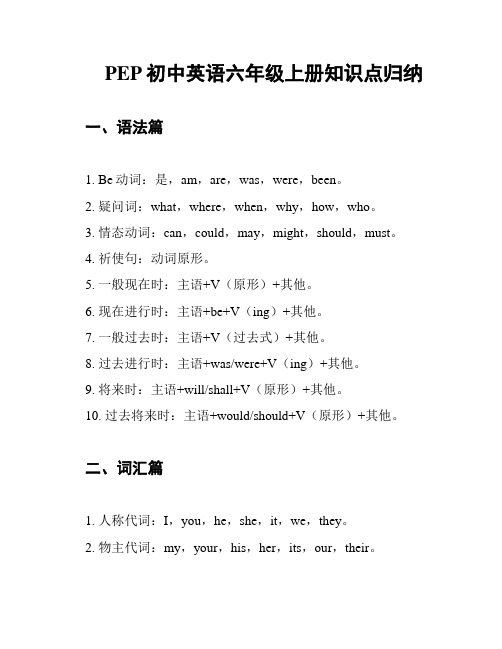
PEP初中英语六年级上册知识点归纳一、语法篇1. Be动词:是,am,are,was,were,been。
2. 疑问词:what,where,when,why,how,who。
3. 情态动词:can,could,may,might,should,must。
4. 祈使句:动词原形。
5. 一般现在时:主语+V(原形)+其他。
6. 现在进行时:主语+be+V(ing)+其他。
7. 一般过去时:主语+V(过去式)+其他。
8. 过去进行时:主语+was/were+V(ing)+其他。
9. 将来时:主语+will/shall+V(原形)+其他。
10. 过去将来时:主语+would/should+V(原形)+其他。
二、词汇篇1. 人称代词:I,you,he,she,it,we,they。
2. 物主代词:my,your,his,her,its,our,their。
3. 形容词:big,small,long,short,tall,fat,thin,heavy,light,old,young。
4. 副词:often,seldom,always,never,sometimes,very,too,so,quite。
5. 数词:序数词(first,second,third)和基数词(one,two,three)。
6. 时间词:week,month,year,morning,afternoon,evening,night。
7. 颜色词:red,green,blue,yellow,white,black。
8. 动词:play,listen,watch,read,write,swim,dance,sing,draw,speak。
9. 名词:book,desk,chair,table,bed,door,window,picture,pen,ruler,bottle,bag,pencil case。
三、对话篇3. Talking about family: How many people are there in your family? What do your parents do?4. Talking about hobbies: Do you like…? What’s your favourite…?5. Talking about school: What subjects do you study at school? Who’s your favourite teacher?6. Talking about daily routines: What time do you get up/go to bed? What do you do on weekends?希望以上知识点归纳对您有所帮助。
六年级上册英语书上的笔记
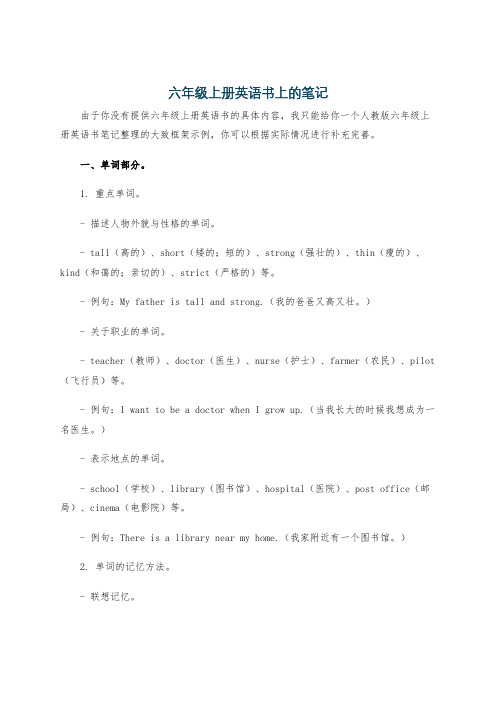
六年级上册英语书上的笔记由于你没有提供六年级上册英语书的具体内容,我只能给你一个人教版六年级上册英语书笔记整理的大致框架示例,你可以根据实际情况进行补充完善。
一、单词部分。
1. 重点单词。
- 描述人物外貌与性格的单词。
- tall(高的)、short(矮的;短的)、strong(强壮的)、thin(瘦的)、kind(和蔼的;亲切的)、strict(严格的)等。
- 例句:My father is tall and strong.(我的爸爸又高又壮。
)- 关于职业的单词。
- teacher(教师)、doctor(医生)、nurse(护士)、farmer(农民)、pilot (飞行员)等。
- 例句:I want to be a doctor when I grow up.(当我长大的时候我想成为一名医生。
)- 表示地点的单词。
- school(学校)、library(图书馆)、hospital(医院)、post office(邮局)、cinema(电影院)等。
- 例句:There is a library near my home.(我家附近有一个图书馆。
)2. 单词的记忆方法。
- 联想记忆。
- 例如记忆“hospital”,可以联想到“host(主人)+pi(劈)+tal(它了)”,想象主人劈了医院的某个东西(一种奇特的联想帮助记忆)。
- 分类记忆。
- 把职业类单词放在一起记忆,如teacher、doctor、nurse等,可以对比记忆它们的发音和拼写特点。
二、句型部分。
1. 询问人物身份与外貌性格的句型。
- Who's your art teacher?(你的美术老师是谁?)- 回答:Mr. Jones.(琼斯先生。
)- What's he like?(他长什么样?/他是个什么样的人?)- 回答:He's old and kind.(他年纪大而且很和蔼。
)2. 表达喜好的句型。
6年级上册英语课堂笔记
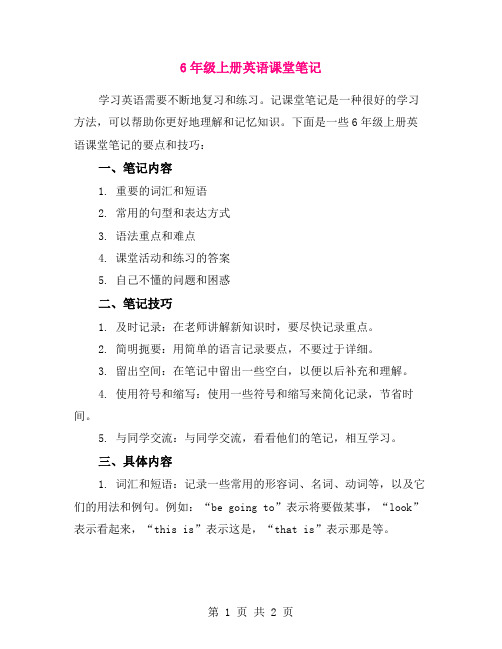
6年级上册英语课堂笔记学习英语需要不断地复习和练习。
记课堂笔记是一种很好的学习方法,可以帮助你更好地理解和记忆知识。
下面是一些6年级上册英语课堂笔记的要点和技巧:一、笔记内容1. 重要的词汇和短语2. 常用的句型和表达方式3. 语法重点和难点4. 课堂活动和练习的答案5. 自己不懂的问题和困惑二、笔记技巧1. 及时记录:在老师讲解新知识时,要尽快记录重点。
2. 简明扼要:用简单的语言记录要点,不要过于详细。
3. 留出空间:在笔记中留出一些空白,以便以后补充和理解。
4. 使用符号和缩写:使用一些符号和缩写来简化记录,节省时间。
5. 与同学交流:与同学交流,看看他们的笔记,相互学习。
三、具体内容1. 词汇和短语:记录一些常用的形容词、名词、动词等,以及它们的用法和例句。
例如:“be going to”表示将要做某事,“look”表示看起来,“this is”表示这是,“that is”表示那是等。
2. 句型和表达方式:记录一些常用的日常用语和表达方式,例如问候语、自我介绍、感谢、道歉等。
同时也要注意一些特殊的句型,例如“What’s wrong with you?”、“How about...?”等。
3. 语法重点和难点:对于6年级上册的英语语法重点和难点,主要包括一般现在时态、形容词的比较级和最高级、there be句型等。
要特别注意这些语法的用法和例句,以及容易出错的地方。
4. 课堂活动和练习:积极参与课堂活动,做好课堂练习。
在笔记中记录课堂活动和练习的答案,以便以后复习。
5. 自己不懂的问题和困惑:对于自己不懂的问题,要及时向老师或同学请教,在笔记中记录下来。
对于一些困惑的地方,也要及时解决,不要让它们成为你学习英语的障碍。
总之,6年级上册英语课堂笔记是非常重要的学习工具,可以帮助你更好地理解和记忆知识。
通过不断地复习和练习,这些笔记将成为你学习英语的好帮手。
人教版小学六年级上册英语知识点归纳

人教版小学六年级上册英语知识点归纳第一单元:四会单词:young年轻的funny滑稽可笑的tall高的strong强壮的kind和蔼的old年老的short矮的thin瘦的Mr先生like像;喜欢strict 严格的smart聪明的;巧妙的active积极的;活跃的quiet安静的;文静的very很;非常but但是缩写形式:who’s=who is what’s=what is he’s=he is she’s=she is重要句型:1.Who’s your art teacher?你们的美术老师是谁?----Mr Hu.胡先生.2.What’s he like?他长得什么样子? ----He’s short and thin.他又矮又瘦3.Is she young?她年轻吗?----Yes,she is/No, she isn’t.以前的知识:I have a new math teacher.我有一个新数学老师.(小学三年级已经学过I have a pen.)注意:划线部分可以替换.第二单元:四会单词:Monday星期一Tuesday星期二Wednesday星期三Thursday星期四Friday星期五Saturday星期六Sunday星期日day天;日子have有;吃on 在……时候too也;太短语:do homework做作业watch TV看电视read books读书What about?......怎么样?do housework做家务play computer games玩电脑游戏重点句型:1.What day is it today?今天星期几?—It’s Monday.星期一.2. What do we have on Mondays?星期一我们有什么课?—We have English,science,computer and P.E.我们有英语课,科学,计算机跟体育课.3.What do you do on Saturdays?星期六你干什么?(具体的某一天前用介词on,在具体的时间前,用介词at)—I often do my homework.我通常做家庭作业.4.What about you?你呢?—I do my homework,too.我也是做家庭作业.第三单元:四会单词:eggplant茄子fish鱼green beans青豆tofu豆腐potato土豆tomato西红柿for为;给lunch中餐;午饭we我们tasty好吃的;可口的sweet甜的sour酸的fresh新鲜的salty咸的favourite最喜爱的;特别喜爱的fruit水果grape葡萄缩写形式:they’re=they are don’t=do not重点句型:1.What would you like for lunch?你午餐想吃什么?-----I’d like some tomatoes and mutton.我想吃一些西红柿跟羊肉.2.What’s your favourite fruit?你最喜欢的水果是什么?------/I like apples.我喜欢苹果.3.I don’t like grapes.我不喜欢葡萄.4.Bananas are my favourite.我最喜欢香蕉.第四单元一. 单词:empty the trash倒垃圾cook the meals 做饭water the flowers浇花sweep the floor扫地clean the bedroom打扫卧室make the bed铺床set the table摆餐具wash the clothes洗衣服do the dishes洗碗碟put away the clothes收拾衣服can’t = cannot(不会;不能)use a computer(使用计算机)二. 句子:1. I’m helpful!I can sweep the floor。
六年级上册英语书笔记
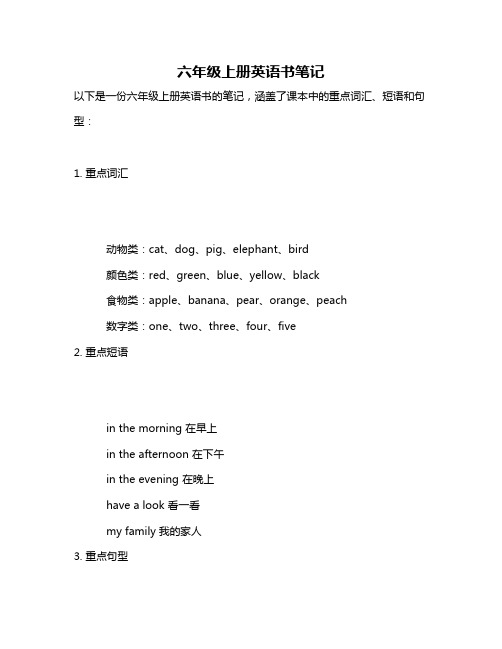
六年级上册英语书笔记
以下是一份六年级上册英语书的笔记,涵盖了课本中的重点词汇、短语和句型:
1. 重点词汇
动物类:cat、dog、pig、elephant、bird
颜色类:red、green、blue、yellow、black
食物类:apple、banana、pear、orange、peach
数字类:one、two、three、four、five
2. 重点短语
in the morning 在早上
in the afternoon 在下午
in the evening 在晚上
have a look 看一看
my family 我的家人
3. 重点句型
What do you have? 你有什么?
I have a/an... 我有一个/一个...
This is my... 这是我的...
4. 语法重点
简单现在时态(一般现在时)的基本结构:主语+ 动词原形+ 其他。
例如:I have a cat.(我有一只猫。
)
指示代词的基本用法:this(这个)、that(那个)、these(这些)、those(那些)。
例如:This is my dog.(这是我的狗。
)
5. 日常用语
Good morning! 早上好!
Good afternoon! 下午好!
Good evening! 晚上好!
Thank you! 谢谢!
You are welcome! 不客气!
6. 学习方法建议
多听录音,模仿标准发音。
多读多背,培养语感。
多做练习,巩固所学知识。
六年级上册英语第六单元知识点笔记

六年级上册英语第六单元知识点笔记目录1. 词汇2. 语法3. 句型4. 阅读理解一、词汇1. 家庭成员- father 父亲- mother 母亲- brother 兄弟- sister 姐妹- grandmother 祖母- grandfather 祖父2. 家居用品- sofa 沙发- table 桌子- ch本人r 椅子- bed 床- lamp 灯3. 衣服- dress 裙子- shirt 衬衫- pants 裤子 - shoes 鞋子 - hat 帽子二、语法1. 物主代词- my 我的- your 你的- his 他的- her 她的- its 它的- our 我们的 - your 你们的 - their 他们的2. 短语动词- clean up 收拾- put on 穿上- take off 脱下- look after 照顾- get up 起床3. 连词- and 和- but 但是- or 或者- so 所以- because 因为三、句型1. 对于家庭成员的描述- This is my father. 这是我的父亲。
- She is my grandmother. 她是我的祖母。
- They are my brothers. 他们是我的兄弟。
2. 表达喜好的句型- I like playing basketball. 我喜欢打篮球。
- He likes reading books. 他喜欢读书。
- She doesn't like dancing. 她不喜欢跳舞。
3. 对物品的描述- The sofa is big. 这个沙发很大。
- The lamp is on the table. 灯放在桌子上。
- My hat is red. 我的帽子是红色的。
四、阅读理解1. 阅读理解题目- 根据所给的家庭成员和家居用品,回答相关问题。
- 例题:Who is the boy in the picture?(这张图片中的男孩是谁?)- 答案:He is my brother.(他是我的兄弟。
PEP小学英语六年级上册知识点总结(最新最全)

PEP小学英语六年级上册知识点总结(最新最全)Unit1HowDoYouGoThere?知识点归纳(一)、词汇四会bike(自行车)by(乘坐)bus(公共汽车)foot(脚)train(火车)how(怎样)plane(飞机)gotoschool(上学)ship(轮船)subway(地铁)(交通工具前加by,表示乘坐但步行要用onfoot)fifth第五remember记住find找到difference不同same相同的every每个所有的三会country国家mean意思是drive驾驶right右边的side边England英国Australia澳大利亚however但是left左边的if如果must必须(二)、重点句型①询问交通方式用疑问代词how ——Howdoyougotoschool?你怎样去上学?——Igotoschoolonfoot.我走路去上学。
——HowdoyougotoCanada?你怎么去加拿大。
——Igobyplane.我坐飞机去。
Whereisyourhome?你家在哪里?——It’snearthepostoffice.在邮局旁边。
问路——HowcanIgettoZhongshanPark?我怎么去中山公园?——YoucangobytheNo.1bus. YoucantaketheNo.1bus.交通规则(trafficrules)Stopataredlight.红灯停Waitatayellowlight.黄灯停Goatagreenlight.绿灯行Unit2Whereisthesciencemuseum?词汇library图书馆postoffice邮局hospital医院places:cinema电影院(地点)bookstore书店(东)eastwest(西) sciencemuse科学博物馆bank银行school学校south(南)supermarket超市shoestore鞋店where在哪里pleas请nextto与…相邻right右边,正确的left左边straight成直线地then然后turn转弯excuseme对不起want想要apairof双minute分钟tell告诉take乘坐far远afterschool放学以后getoff上车geton下车twelfth第十二party聚会;晚会start开始buy买句型一、问路1.Whereisthecinema,please?请问电影院在哪儿?nexttothehospital.在医院的旁边。
六年级上册英语知识点归纳笔记

六年级上册英语知识点归纳笔记六年级上册英语知识点归纳整理如下:一、重点句子:1. How do you go to school? 你是怎样去上学的?2.where is the restaurant? 餐馆在哪里?3. Usually I go to school on foot. 我通常走路去上学。
4. Sometimes I go by bike. 有时候我骑自行车去。
、5. 问路之前,出于礼貌,我们要说“Excuse me”与后面的句子要用标点符号隔开。
6. Look at the traffic lights, remember the trafficrules. 看着交通灯,记住交通规则。
7. Stop at a red light. Wait at a yellow light. Go at agreen light. 红灯停。
黄灯等一等。
绿灯行。
8. Red means stop, yellow means wait, green means go. 红色的意思是停止,黄色的意思是等待,绿色的意思是通行。
9. How can I get to the park? 我该怎样到达公园呢?10. You can go by the No. 15 bus. 你可以坐15路公交车去。
二.重点知识:1. 坐某种交通工具用by,例如:by bike, by train。
而走路用“on”例如on foot.2. 国家名字,地方名字第一个字母要大些:例如:Canada 加拿大, China中国, America美国, England英国, Australia 澳大利亚3. 频度副词是表示做的次数多少的词语。
从多到少依次排列为:always总是,usually通常,often经常,sometimes有时候,never从不。
频度副词可以放在句首,也可以放在人称后面。
例如:Usually I go to school by bus. = I usually go to school bybus.4. near近的,far远的。
六年级上册英语的笔记
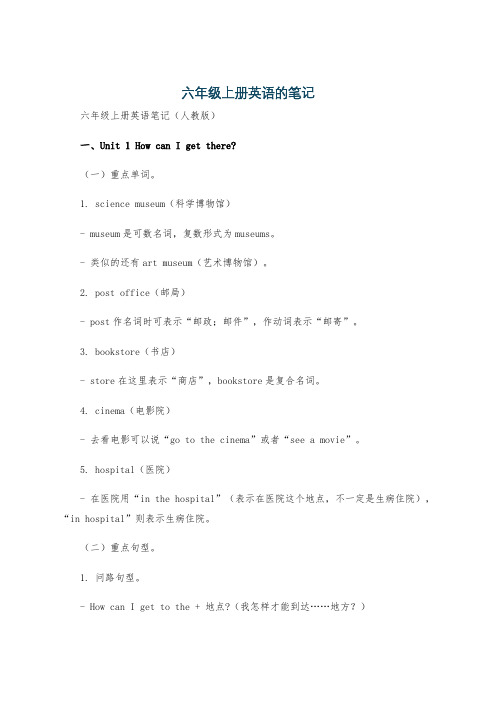
六年级上册英语的笔记六年级上册英语笔记(人教版)一、Unit 1 How can I get there?(一)重点单词。
1. science museum(科学博物馆)- museum是可数名词,复数形式为museums。
- 类似的还有art museum(艺术博物馆)。
2. post office(邮局)- post作名词时可表示“邮政;邮件”,作动词表示“邮寄”。
3. bookstore(书店)- store在这里表示“商店”,bookstore是复合名词。
4. cinema(电影院)- 去看电影可以说“go to the cinema”或者“see a movie”。
5. hospital(医院)- 在医院用“in the hospital”(表示在医院这个地点,不一定是生病住院),“in hospital”则表示生病住院。
(二)重点句型。
1. 问路句型。
- How can I get to the + 地点?(我怎样才能到达……地方?)- 例如:How can I get to the post office?- 回答:You can go by + 交通工具.(你可以乘坐……去。
)如You can go by bus.- 还可以用Turn left/right at + 地点.(在……地方向左/右转。
)例如Turn left at the second crossing.2. 位置关系句型。
- Where is the + 地点?(……地方在哪里?)- It's near/next to/behind/in front of...(它在……附近/紧挨着/在……后面/在……前面。
)- 例如:Where is the bookstore? It's next to the cinema.二、Unit 2 Ways to go to school。
(一)重点单词。
1. by(乘坐)- by + 交通工具,表示交通方式,中间不加冠词。
六年级上册英语知识点归纳

六年级上册英语知识点归纳六年级上册英语主要包括词汇、语法、句型和日常交际用语等方面的内容。
以下是对常见知识点的详细介绍:1. 词汇:六年级上册的词汇主要包括动词、名词、形容词以及其他一些词性的词汇。
(1)动词:在六年级上册中,学生需要掌握一些基本的动词,如be动词的各种形式(am, is, are, was, were),have的各种形式(has, had),do的各种形式(do, does, did)等。
此外,还需要学习一些常见的动词短语,如go to school, play football, eat breakfast等。
(2)名词:学生需要学习一些常见的名词,如animals, family, school等。
此外,还需要学习名词的复数形式和所有格形式。
(3)形容词:学生需要学习一些常见的形容词,如big, tall, happy等。
此外,还需要学习形容词的比较级和最高级形式。
2. 语法:六年级上册的语法主要包括时态、代词、副词、介词、连词和动词的时态等方面的内容。
(1)时态:学生需要学习一些基本的时态,如一般现在时、一般过去时和一般将来时等。
需要掌握时态的构成和用法。
(2)代词:学生需要学习一些常见的代词,如主格代词、宾格代词、形容词性物主代词和名词性物主代词等。
需要掌握代词的用法和变化。
(3)副词:学生需要学习一些常见的副词,如well, often, never等。
需要掌握副词的用法和变化。
(4)介词:学生需要学习一些常见的介词,如in, on, at, to等。
需要掌握介词的用法和搭配。
(5)连词:学生需要学习一些常见的连词,如and, but, or等。
需要掌握连词的用法和搭配。
(6)动词的时态:学生需要学习一些常见的动词时态,如一般现在时的行为动词、非行为动词和情态动词的用法和变化。
3. 句型:六年级上册的句型主要包括陈述句、疑问句、否定句、祈使句和感叹句等方面的内容。
(1)陈述句:学生需要学习一些常见的陈述句,如主语+谓语动词+宾语的基本陈述句结构。
六年级英语知识点上册笔记
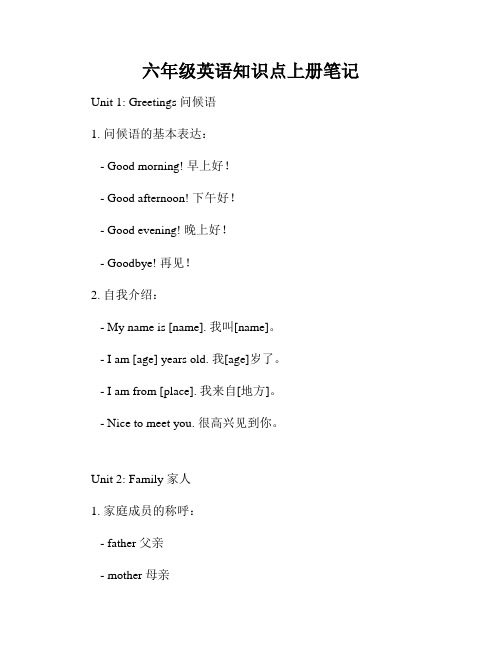
六年级英语知识点上册笔记Unit 1: Greetings 问候语1. 问候语的基本表达:- Good morning! 早上好!- Good afternoon! 下午好!- Good evening! 晚上好!- Goodbye! 再见!2. 自我介绍:- My name is [name]. 我叫[name]。
- I am [age] years old. 我[age]岁了。
- I am from [place]. 我来自[地方]。
- Nice to meet you. 很高兴见到你。
Unit 2: Family 家人1. 家庭成员的称呼:- father 父亲- mother 母亲- brother 兄弟- sister 姐妹- grandfather 祖父- grandmother 祖母2. 表示家人关系的句子:- This is my father. 这是我的爸爸。
- She is my sister. 她是我的姐姐。
- His grandmother is very kind. 他的祖母人很好。
Unit 3: School Life 学校生活1. 学科名称:- Chinese 语文- Math 数学- English 英语- Science 科学- History 历史2. 表示学习活动的句子:- I study Chinese every day. 我每天学习语文。
- We have math class in the morning. 我们上午有数学课。
- Our English teacher is very friendly. 我们的英语老师很友好。
Unit 4: Daily Routines 日常生活1. 时间表达方法:- in the morning 早上- in the afternoon 下午- in the evening 晚上- at night 在晚上2. 描述日常活动的句子:- I get up at 7 o'clock in the morning. 我早上7点起床。
六上英语期末总结笔记
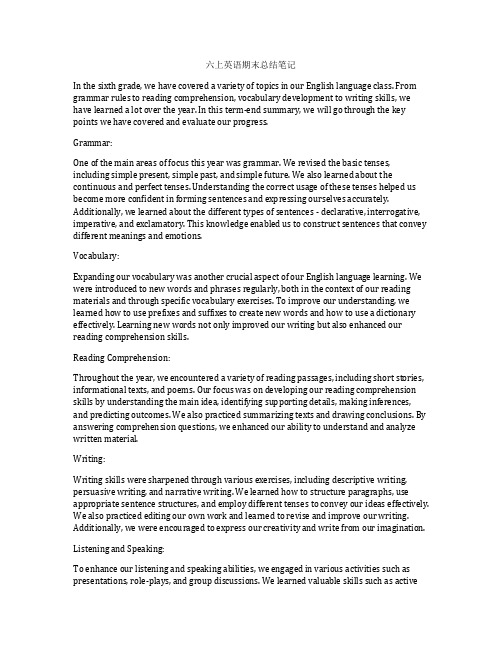
六上英语期末总结笔记In the sixth grade, we have covered a variety of topics in our English language class. From grammar rules to reading comprehension, vocabulary development to writing skills, we have learned a lot over the year. In this term-end summary, we will go through the key points we have covered and evaluate our progress.Grammar:One of the main areas of focus this year was grammar. We revised the basic tenses, including simple present, simple past, and simple future. We also learned about the continuous and perfect tenses. Understanding the correct usage of these tenses helped us become more confident in forming sentences and expressing ourselves accurately. Additionally, we learned about the different types of sentences - declarative, interrogative, imperative, and exclamatory. This knowledge enabled us to construct sentences that convey different meanings and emotions.Vocabulary:Expanding our vocabulary was another crucial aspect of our English language learning. We were introduced to new words and phrases regularly, both in the context of our reading materials and through specific vocabulary exercises. To improve our understanding, we learned how to use prefixes and suffixes to create new words and how to use a dictionary effectively. Learning new words not only improved our writing but also enhanced our reading comprehension skills.Reading Comprehension:Throughout the year, we encountered a variety of reading passages, including short stories, informational texts, and poems. Our focus was on developing our reading comprehension skills by understanding the main idea, identifying supporting details, making inferences, and predicting outcomes. We also practiced summarizing texts and drawing conclusions. By answering comprehension questions, we enhanced our ability to understand and analyze written material.Writing:Writing skills were sharpened through various exercises, including descriptive writing, persuasive writing, and narrative writing. We learned how to structure paragraphs, use appropriate sentence structures, and employ different tenses to convey our ideas effectively. We also practiced editing our own work and learned to revise and improve our writing. Additionally, we were encouraged to express our creativity and write from our imagination.Listening and Speaking:To enhance our listening and speaking abilities, we engaged in various activities such as presentations, role-plays, and group discussions. We learned valuable skills such as activelistening, asking and answering questions, expressing opinions, and debating. These activities helped us gain confidence in speaking English and improve our communication skills.Overall, this year has been valuable in building a solid foundation in English language skills. Our grammar, vocabulary, reading comprehension, writing, listening, and speaking abilities have all improved significantly. It is important to continue practicing these skills beyond the classroom to maintain and further enhance our proficiency.Moving forward, we should continue to read extensively in English to expand our vocabulary and improve our reading comprehension. Regular writing practice will help us refine our writing skills further. Engaging in conversations with English speakers and watching movies or TV shows in English will continue to enhance our listening and speaking abilities.In conclusion, the sixth grade English language course has provided us with a solid foundation in grammar, vocabulary, reading comprehension, writing, listening, and speaking. It is crucial to continue practicing these skills to become even more proficient in English. With dedication and consistent effort, we can continue to improve and excel in the English language.。
六年级上册英语课文笔记
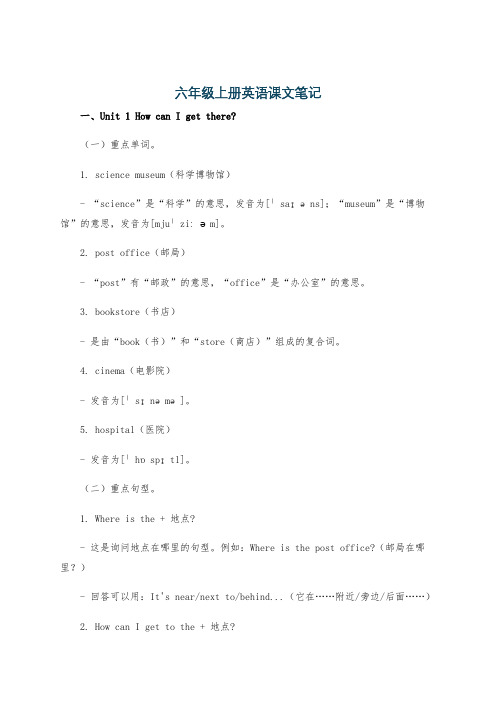
六年级上册英语课文笔记一、Unit 1 How can I get there?(一)重点单词。
1. science museum(科学博物馆)- “science”是“科学”的意思,发音为[ˈsaɪəns];“museum”是“博物馆”的意思,发音为[mjuˈziːəm]。
2. post office(邮局)- “post”有“邮政”的意思,“office”是“办公室”的意思。
3. bookstore(书店)- 是由“book(书)”和“store(商店)”组成的复合词。
4. cinema(电影院)- 发音为[ˈsɪnəmə]。
5. hospital(医院)- 发音为[ˈhɒspɪtl]。
(二)重点句型。
1. Where is the + 地点?- 这是询问地点在哪里的句型。
例如:Where is the post office?(邮局在哪里?)- 回答可以用:It's near/next to/behind...(它在……附近/旁边/后面……)2. How can I get to the + 地点?- 这是询问如何到达某地的句型。
例如:How can I get to the science museum?(我怎样才能到达科学博物馆?)- 回答可以是:You can go by bus/on foot/by bike...(你可以乘公共汽车/步行/骑自行车……)(三)课文中的语法点。
1. 方位介词。
- near(在……附近):表示距离较近,例如:The bookstore is near the school.(书店在学校附近。
)- next to(紧挨着):距离更近,有相邻的关系,如:The post office is next to the cinema.(邮局紧挨着电影院。
)- behind(在……后面):表示在物体的后方,例如:The hospital is behind the park.(医院在公园后面。
六年级上册英语译林版课堂笔记
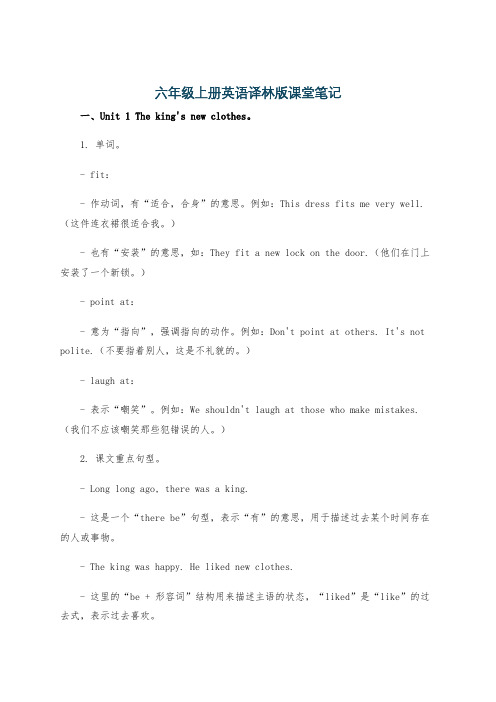
六年级上册英语译林版课堂笔记一、Unit 1 The king's new clothes。
1. 单词。
- fit:- 作动词,有“适合,合身”的意思。
例如:This dress fits me very well.(这件连衣裙很适合我。
)- 也有“安装”的意思,如:They fit a new lock on the door.(他们在门上安装了一个新锁。
)- point at:- 意为“指向”,强调指向的动作。
例如:Don't point at others. It's not polite.(不要指着别人,这是不礼貌的。
)- laugh at:- 表示“嘲笑”。
例如:We shouldn't laugh at those who make mistakes.(我们不应该嘲笑那些犯错误的人。
)2. 课文重点句型。
- Long long ago, there was a king.- 这是一个“there be”句型,表示“有”的意思,用于描述过去某个时间存在的人或事物。
- The king was happy. He liked new clothes.- 这里的“be + 形容词”结构用来描述主语的状态,“liked”是“like”的过去式,表示过去喜欢。
- Two men visited the king. “My king, we can make new clothes for you.”- “visit”在这里是“拜访,访问”的意思,“make sth for sb”表示“为某人制作某物”。
3. 语法。
- 一般过去时:- 在本单元中,很多动词都使用了过去式形式,如“was”(is的过去式)、“liked”(like的过去式)等。
一般过去时表示过去某个时间发生的动作或存在的状态。
- 规则动词的过去式变化:- 一般在动词原形末尾加 - ed,如:look - looked,play - played。
六年级上英语笔记
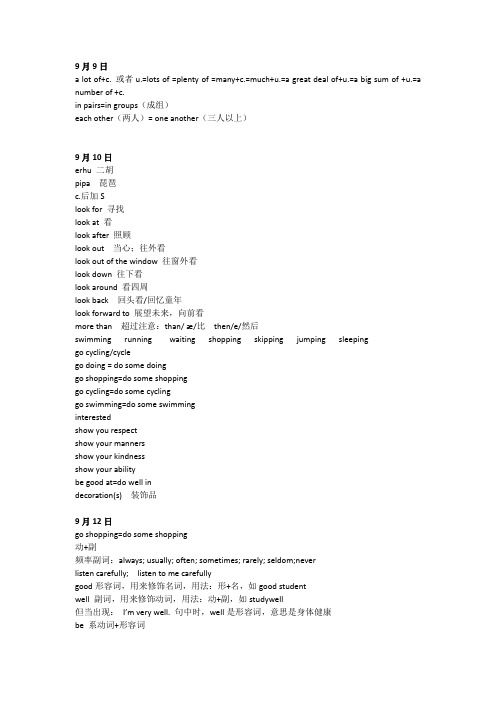
9月9日a lot of+c. 或者u.=lots of =plenty of =many+c.=much+u.=a great deal of+u.=a big sum of +u.=a number of +c.in pairs=in groups(成组)each other(两人)= one another(三人以上)9月10日erhu 二胡pipa 琵琶c.后加Slook for 寻找look at 看look after 照顾look out 当心;往外看look out of the window 往窗外看look down 往下看look around 看四周look back 回头看/回忆童年look forward to 展望未来,向前看more than 超过注意:than/ æ/比then/e/然后swimming running waiting shopping skipping jumping sleepinggo cycling/cyclego doing = do some doinggo shopping=do some shoppinggo cycling=do some cyclinggo swimming=do some swimminginterestedshow you respectshow your mannersshow your kindnessshow your abilitybe good at=do well indecoration(s) 装饰品9月12日go shopping=do some shopping动+副频率副词:always; usually; often; sometimes; rarely; seldom;neverlisten carefully; listen to me carefullygood形容词,用来修饰名词,用法:形+名,如good studentwell 副词,用来修饰动词,用法:动+副,如studywell但当出现:I’m very well. 句中时,well是形容词,意思是身体健康be 系动词+形容词行为动词+副词,如teach well, well为副词修饰行为动词teachlearn well, look wellmake a shopping listlook at me carefully 仔细看我系动词包括:look, seem, smell, taste, sound, feel(这些统称感官系动词),可译成“……上去”/“……起来”one of+复数介词+动名词/宾语like to do/doingget sth. from sb.最高级形容词前加theIt’s time for sth.=It’s time to do sht.elder 更年长的+名9月15日people 人,单复数一致56 people 56人;但是一个人不用a people,而用a person;3persons三个人a people的含义是一个民族;56 peoples 是56个民族do/make/get/sing/dance+for sb.Her(不可用She’s)name is ╳╳╳.they 用做主语,them 用做宾语,their指总称,theirs是物主代词=their+名,他们的Alice’s birthday cards are from who?I’m from China. Where + are you from?an unclesheep单复数一致:a sheep; two sheepfish做一条鱼两条鱼解释时单复数一致:a fish; two fishfish做鱼的种类时,复数要加-es:two fishes两种鱼fish做鱼肉时,不可数have a look at =look at句中有have/has+got时,不能使用do,does,疑问句中要直接把have,has 提前,如Have you this book?give sth.to sb.take care of=look after 照看sing well, sing a song wellHe sings well. He is a good singer.take good care of himaccording to the passage根据课文解释talk about, talk with sb. Talk about sth. with sb.have an idea 有了一个主意of medium height 中等身高a little bit fat有一点胖bring bad luck to me 把坏运带给我lucky star幸运星get turn become 变得……;对天气、心理变化,用getIt’s getting colder and colder.比较级+比较级,表示越来越…… It’s getting darker and darker. more and more beautiful It’s getting whiter and whiter.angry upset (脸上)颜色初中常用系表词:go wrong; go bad; go mad; come true; fall ill; fall asleep; feel sleepy; keep healthy; stay healthybring 带来back 带去too 表示也,只能放句尾laugh at 嘲笑at weekend 在周末once a week 一周一次用how often提问9月17日love me 动词+人双宾语:人、物如give me(人)a book(物)=give a book to meshow me a book; take him a booklucky 形容词;unlucky un-前缀形容词副词:+ly luckily而不是luckylyfall asleep feel sleep come truein the tree躲在树上可用how提问的句子(怎样、程度、长相):1. He goes to school on foot.2. He studies well.3. He looks fat.可用how much提问的句子(数量表达,一般不可数)1.How much is it?2.How much water is there?当问可数名词的数量时,用how many. 如How many apples are there in the tree?How old/How heavy/How large/How long=How much time……?How often 多久一次once a weekHow many times a week+ 一般疑问句How soon 还要多久He will be back in a week. 此句中的in,意为在……以后He has lived in Shanghai for 3 years. 就划线部分提问用How long……How far……有多远元音字母a e Io ugive a kiss给一个吻,亲一个否定句中的许多只能用many,much,不能用a lot of 和lots ofHard-working 努力工作地Hopes to get希望得到spend……on 把剩下的at midnight 半夜ride a bike 骑车laugh at 嘲笑以-ly结尾的形容词:friendly; lovely; lively; deadly; monthly; yearly; hourly; dailyhourly worker 钟点工be 动词也是系动词所有格有以下四种:1.‘s2. Of3. 名词性物主代词mine4. 形容词性物代mymy friends my father’s friendsmorning nightin the afternoon at midnightevening noon特指某个早晨用on:on Tuesday mornig; on the night of the sixth of Marchshare sth. with sb. 与某人分享snack 零食share snacks 分享零食secret(s) 秘密recite the text 背诵文章on-line shopping 网购sth. to sb.Sb. Sth.the timetell the truth inthe storythe differencelies9月19日show=let me have a lookat weekendsMonday; Tuesday; Wednesday; Thursday; Friday; Saturday; SundayJanuary; February; March; April; May; June; July; August; September; October; November; Decemberfirst; second; third; fourth; fifth; fourteenth; ninth; fortieth; nineteenth; ninety-ninth; twentieth; twelfth及物动词可带名词walk to school动词+介词+名词go/come + home/here/there ,中间不加介词,因为home/here/there是副词help each otherlearn from each other 互相学习have/has been to到目前为止曾经去过have/has been in到目前为止曾经呆在……have/has gone tohave/has done到目前为止曾经做过现在分词:V+ing过去分词:done规则动词变为过去分词时+ed, 如love-loved不规则动词变为过去分词时有各种变化形式,如go-gonebeen to : 去过been in: 呆在那里gone to:去了还未回来他去了那里:He has gone there. 注意:不可写成He has gone to there.因gone是瞬间动词。
- 1、下载文档前请自行甄别文档内容的完整性,平台不提供额外的编辑、内容补充、找答案等附加服务。
- 2、"仅部分预览"的文档,不可在线预览部分如存在完整性等问题,可反馈申请退款(可完整预览的文档不适用该条件!)。
- 3、如文档侵犯您的权益,请联系客服反馈,我们会尽快为您处理(人工客服工作时间:9:00-18:30)。
六年级上册英语杂记Unit 1 How do you go to school?主要单词:by plane 坐飞机by ship 坐轮船on foot步行by bike 骑自行车by bus 坐公共汽车by train 坐火车traffic lights交通灯traffic rules交通规则Stop at a red light 红灯停Wait at a yellow light 黄灯等Go at a green light 绿灯行主要句子:How do you go to school?你怎么去上学?Usually I go to school on foot. Sometimes I go by bus.通常我步行去上学。
有时候骑自行车去。
How can I get to Zhongshan Park ?我怎么到达中山公园?You can go by the No. 15 bus.你可以坐15路公共汽车去。
知识点:1、There are many ways to go somewhere.到一个地方去有许多方法。
这里的ways一定要用复数。
因为there are是There be句型的复数形式。
2、get to到达.关本单元我们还要学习与get相关的短语:get on 上车get off下车3、on foot 步行乘坐其他交通工具大都可以用介词by…, 但是步行只能用介词on 。
4、go to school的前面绝对不能加the,这里是固定搭配。
5、USA 和US 都是美国的意思。
另外America狭义也是美国的意思。
6 go to the park前面一定要加the.如果要去的地方有具体的名字,就不能再加the ,如go to Zhongshan Park . 如果要去的地方没有具体名字,由要在前面加the. go to school除外。
7、How do you go to …?你怎样到达某个地方?如果要问的是第三人称单数,则要用:How does he/she…go to …?8、反义词:get on(上车)---get off(下车) near(近的)—far(远的) fast(快的)—slow(慢的) because(因为)—why(为什么)same(相同的)—different(不同的)9、近义词:see you---goodbye sure---certainly---of course10、频度副词:always 总是,一直usually 通常often经常sometimes 有时候never 从来不Unit 2 Where is the science museum?主要单词:library 图书馆post office 邮局hospital医院cinema 电影院bookstore书店science museum科学博物馆turn left向左转turn right 向右转go straight 直行north北south南east东west西主要句子:Where is the cinema, please? 请问电影院在哪里?It’s next to the hospital. 它与医院相邻。
Turn left at the cinema, then go straight. It’s o n the left.在电影院向左转,然后直行。
它在左边。
知识点:1、near 表示在附近,next to 表示与…相邻。
它的范围比near小。
2、电影院在英语中称为“cinema”,在美语中称为movie theatre.3、for 表示持续多长时间,当表示做某事多长时间都要用for. 如:Walk east for 5 minutes.4、当表示某个地方在另一个地方的哪一方向时,要用介词of。
如:the hospital is east the cinema. 医院在电影院的东边。
5、表示在哪儿转时,用介词at。
如:Turn left at the bank。
在银行左转。
6、find表示“找到”,强调找的结果。
Look for 表示“寻找”,强调找的过程。
7、英文的书信与中文的书信不完全一样:开头:英语是在人称后面加逗号,中文是加冒号。
正文:英语是顶格写,中文要空两个格。
结尾:英语的落款与人名是顶格而且是分开写的。
中文则是另起一行,放在一起且稍靠后一点儿的地方。
8、近义词:bookstore==bookshop 书店go straight==go down直行after school==after class 放学后9、反义词或对应词:here (这里)---there(那里)east(东)---west(西) north(北)---south(南)left(左)---right(右) get on (上车)---get off(下车)10、in the front of…表示在…的前面,是指在该地方的范围内,in front of而则表示在该地方的范围外。
如:in front of our classroom是指在教室的外面而且在教室的前面。
而in the front of classroom则是指在教室里的前面。
11. be far from…表示离某地远. be 可以是am , is ,are。
如:I am far from school now.我现在离学校很远。
My home is not far from school.我家离学校不远。
Unit 3 What are you going to do ?主要单词:this morning 今天上午this afternoon 今天下午this evening 今天晚上next week 下周tomorrow 明天tonight 今晚post card 明信片comic book漫画书newspaper报纸主要句子:What are you going to do on the weekend?你周末打算做什么?I’m going to visit my grandparents this weekend?这个周末我打算去看望我的外祖父母。
Where are you going this afternoon? 你今天下午打算去哪里?I’m going to the bookstore.我打算去书店。
What are you going to buy?你打算去买什么?I’m going to buy a comic book。
我打算去买一本漫画书。
知识点:1、What are you going to do?你想做什么?询问他人在未来的打算。
Be going to 后面要跟动词的原形。
2、this evening 和tonight的区别:this evening指的是今天晚上睡觉以前的时间,一般指晚上十二点以前。
而tonight指的是今晚,一般是指一整晚的时间,通宵。
3、部分疑问代词的意义与用法:(1)What 什么。
用来问是什么,做什么,叫什么,什么样等等。
如:What is your name? 你的名字叫什么?What is your father? 你爸爸是干什么的?What is your hobby?你的爱好是什么?What is your favourite food?你最喜爱的食物是什么?What’s your math teacher like? 你的数学老师长得什么样子?(2)Where , 在哪里,到哪里。
用来问地点。
如:Where are you from?你从哪里来?Where are you going to ?你打算去哪里?Where is my ruler?我的尺子在哪里?(3)When,什么时候。
用来问时间。
如:When is your birthday? 你的生日是什么时候?When are you going to ?你打算什么时候去?When do you go to school?你什么时候去上学?(4)what time 几点了。
用来问具体的时间,如:What time is it? 现在几点了?(5)What colour什么颜色。
用来问物体的颜色。
如:What colour is your schoolbag?你的书包是什么颜色的?(6)What kind of 什么种类。
用来问类别。
如What kind of fruit do you like?你最喜欢哪一种水果?(7)who谁。
用来问人物是谁。
如:Who is your English teacher ?你的英语老师是谁?Who’s that man? 那个男人是谁?(8) whose谁的。
用来问物体的主人是谁?如:Whose pencil is this? 这是谁的铅笔?Whose bike is blue? 谁的自行车是蓝色的?(9) which哪一个。
用来问具体的哪一个。
如:Which season do you like best?你最喜欢哪个季节?Which pencil is ken’s? the long one or the short one?哪只铅笔是Ken的?长的那支还是短的那支?(10)how怎样?用来问身体状况,或者事情的状况,对事件的看法等。
如:How are you?你好吗?How is your mother? 你妈妈好吗?How about you? 你呢?(11)how many多少个。
用来问有多少个,后面要跟名词的复数形式。
如:How many books do you have?你有多少本书?How many kites can you see? 你能看见多少只风筝?(12) how much 多少钱。
用来问物体的价钱。
如:How much are they? 他们多少钱?How much is your schoolbag? 你的书包多少钱?(13)how old 几岁了。
用来问年龄。
如How old are you ? 你几岁了?How old is your father? 你爸爸多大了?(14)why为什么。
用来问原因,一般要用because来回答。
如:why do you like spring?你为什么喜欢春天?Because I can fly kites.国为我可以放风筝。
(15) how long 多长(16)how tall 多高4、I want to be…我想成为… 表示理想。
Unit 4 I have pen pal1、动词变为动名词的规则:动词变为动名词,即是动词加ing。
一般要遵循以下三条规则:(1)一般情况下,在动词的后面直接加ing。
